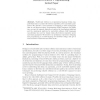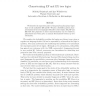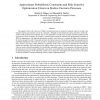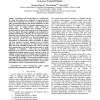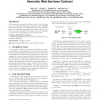106
Voted
ICESS
2004
Springer
15 years 6 months ago
2004
Springer
Abstract. Traditional wisdom in programming language design suggests that there is a trade-off between expressive power and static guarantees. We describe a novel schema for desig...
76
Voted
ECAI
2004
Springer
15 years 6 months ago
2004
Springer
The planning domain language PDDL2.1, used in the 3rd International Planning Competition, has sparked off some controversy in the planning community as researchers consider its exp...
108
click to vote
CONCUR
2004
Springer
15 years 6 months ago
2004
Springer
We describe the expressive power of temporal branching time logics that use the modalities EX and EF. We give a forbidden pattern characterization of the tree languages definable...
117
Voted
CCS
2004
ACM
15 years 6 months ago
2004
ACM
Comparing the expressive power of access control models is recognized as a fundamental problem in computer security. Such comparisons are generally based on simulations between di...
107
Voted
AMAI
2004
Springer
15 years 6 months ago
2004
Springer
The majority of the work in the area of Markov decision processes has focused on expected values of rewards in the objective function and expected costs in the constraints. Althou...
FMCO
2005
Springer
15 years 6 months ago
2005
Springer
Abstract. We compare the expressive power of process calculi by studying the problem of electing a leader in a symmetric network of processes. We consider the π-calculus with mixe...
114
click to vote
VEE
2006
ACM
15 years 6 months ago
2006
ACM
The Pi-calculus is a formalism to model and reason about highly concurrent and dynamic systems. Most of the expressive power of the language comes from the ability to pass communi...
92
Voted
ICTAC
2007
Springer
15 years 6 months ago
2007
Springer
LTL cannot express the whole class of ω-regular languages and several extensions have been proposed. Among them, Quantified propositional Linear Temporal Logic (QLTL), proposed b...
99
Voted
IEEEARES
2010
IEEE
15 years 7 months ago
2010
IEEE
—Managing access control policies is a complex task. We argue that much of the complexity is unnecessary and mostly due to historical reasons. There are number of legacy policy s...
103
click to vote
WWW
2008
ACM
16 years 1 months ago
2008
ACM
In this paper, we incorporate concrete domain and action theory into a very expressive Description Logic (DL), called ALCQO. Notably, this extension can significantly augment the ...
